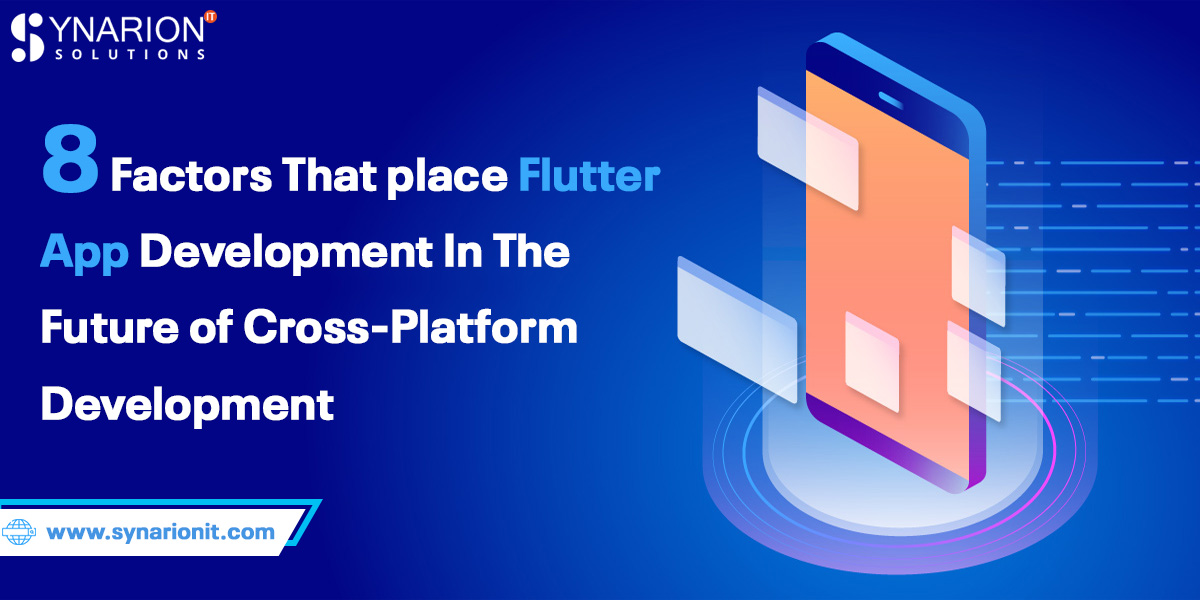Do you want to know why you should use Flutter during your next project and what benefits it will bring to your company? This article will be helpful to you if you are a TechLead or any other role in your business that needs you to make successful IT choices.
We'll specifically assist you in understanding what exactly Flutter is and why it's the most successful Cross-Platform App Development is available. You'll discover Flutter's advantages over competing for Cross-Platform languages, as well as how these advantages play a role in both development and marketing operations.
Flutter is a Google open-source UI software development kit that enables you to create apps for various platforms. Apps for Android, iOS, Mac, Windows, Linux, and Google Chrome may all be made using a single codebase. It is one of the best Cross-Platform app development apps yet. The UI toolkit is built in C, C++, and Dart, and it assists you in creating attractive natively compiled apps.
Why Is
Flutter the Next Generation of Cross-Platform Mobile App Development?
Flutter, according to experts, this is the new era of cross-platform mobile app development. Here are some of the explanations for why Flutter is reshaping the cross-platform mobile development app.
1. Every platform shares the same codebase:
Flutter is a development framework that has a single codebase. Now may launch flutter applications on Android, iOS, pc, and the web. Flutter may be a fantastic starting point for a company seeking to join the digital arena with little work and time.
2. Widgets that are completely customizable:
Flutter has a complete set of widgets for creating user interfaces. The widgets are modular and customizable, providing them valuable for future development. Flutter also includes two widget sets. This provides developers with a plethora of creative possibilities for creating visually appealing applications.
3. Application development is completed more quickly:
The framework's capacity to speed the design and development process is the framework's next most significant feature. The feature of a single codebase platform combined with the hot reload feature allows developers to create an app when testing it in legitimate time quickly. This, in fact, plays a critical part in reducing the cost of mobile app development.
4. It is considerably simpler to test:
The QA team might find it easy to test the application since mobile apps are built from a single codebase using Flutter technology. They may test the software on a single platform for functionality, user interface, accessibility, and logical structure rather than trying numerous platforms.
5. Lower Development Costs:
The development cost is an important consideration when creating a mobile app. A mobile app development project typically costs about $30,000. Of course, based on the specifications, the cost may reach $100,000.
Startup companies and smaller companies do not receive the same level of financial support. Furthermore, development costs aren't the only thing to consider. It would help if you also regarded it as extra costs like team building, server costs, marketing, etc.
Flutter significantly lowers development costs. You don't require a platform-specific Cross-Platform App developer because of the one codebase. You may employ Flutter developers to create cross-platform apps. Because the testing standards are relatively minimal, even if you have a limited budget, you can always get cross-platform software up and running.
6. Integration with Firebase:
Integration with Firebase is an underappreciated benefit of utilizing Flutter that many businesses and developers overlook. It is a Google Backend-as-a-Service (BaaS) platform for developing online and mobile apps. Firebase's services, such as databases, analysis, crash reporting, and messaging, may be helpful to developers. Furthermore, since Firebase interacts seamlessly with Flutter, Flutter developers may benefit from it as well.
7. Excellent for MVP:
The term
"minimum viable product" (MVP) refers to a product with just the
functionalities necessary to understand the requirements of the target
consumers. Also, it helps in obtaining sufficient validation to proceed with
the subsequent phases of product development.
MVP is becoming more critical as more software development firms embrace an Agile approach. Showing the MVP to investors and stockholders is essential for businesses who want to bring the product to market quicker. Flutter is excellent for creating an MVP since it requires minimal time and effort to create an app.
8. Flutter community assistance:
The Flutter community is growing by the day. And much more developers are cooperating and expressing their thoughts on the forum. You may find developer additions to the Flutter toolkit here. If you have any questions or concerns, you may post them on social media or in forums.
From the
above, it is evident that Flutter is a massive success in Cross-Platform development programming. The above eight arguments
best demonstrate how Flutter is the primary development strategy for 2021 and
even beyond. Many say it is better than xamarin
Cross-Platform app development.
Flutter, in, In my opinion, is the new era of mobile development. The platform has many
capabilities that may assist us in developing visually appealing mobile apps
that provide a better user experience while also being quicker. Flutter's
popularity has risen over the last several years, and it is expected to
continue in 2021. So, hire a
Cross-Platform App developer now.

Comments
Post a Comment